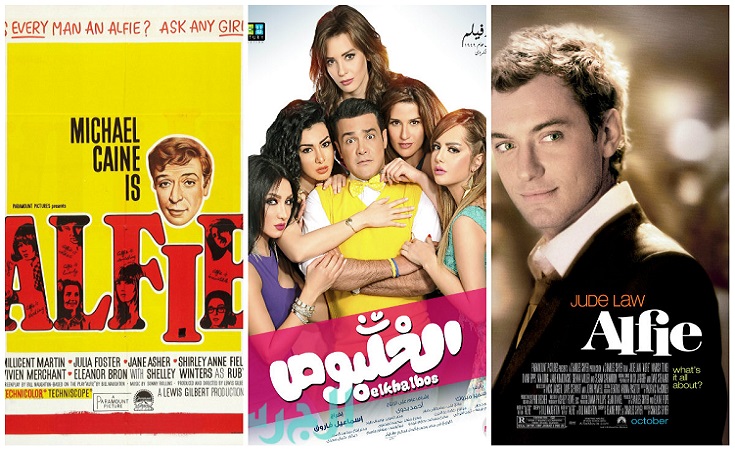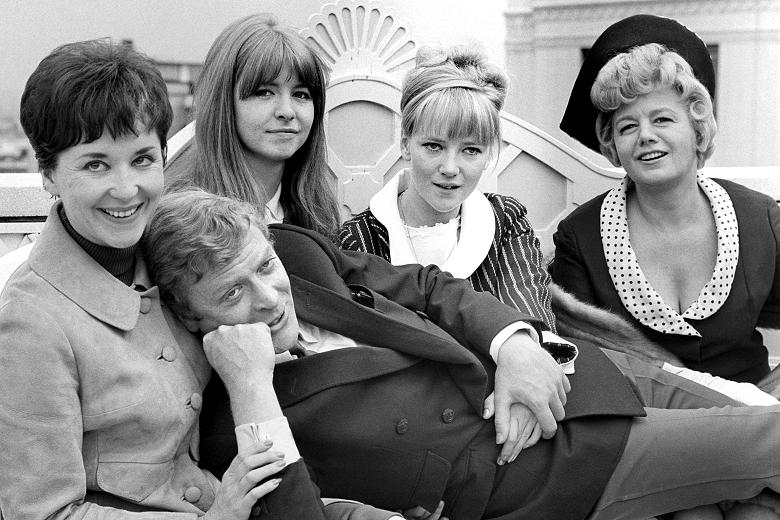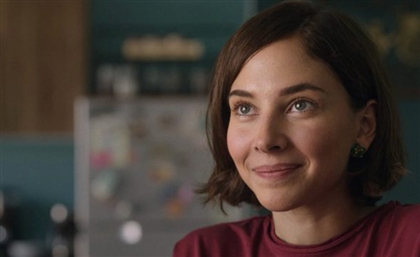Khalboos: Egypt’s Alfie with No Lessons to Spare
Emad El-Din Aysha heads to the cinema for the Egyptian rip off of 2004's Alfie, which is a remake of the original 1966 version only to find that it's dumbed down every time.

Believe it or not, El-Khalboos (The Womaniser), is a harder movie to write about than you may think. Yes it’s a straightforward film about masculine unoosa (spinsterhood) in the usual romantic comedy genre that’s sweeping Egyptian cinemas. And yes it’s not ‘that’ good, but the real problem facing a critic like me who wants to cover all the angles here is that it’s a rip-off, twice removed.
Skin Deep Enthusiasm
It’s a copy of the American movie Alfie (2004), starring Jude Law, which itself is a remake of the older and in my opinion superior Alfie (1966), starring Michael Caine. It’s so obvious it’s not even worth proving. There’s a scene where Youssef (Mohamed Ragab)’s final fiancé wants to repaint his apartment, and there’s a scene like that in Jude Law’s Aflie. There’s a scene where Youssef’s mentions olives (in drinks) and there’s a scene with a drinking binge and an olive in the Jude Law version. There’s a scene where Youssef is getting an AIDS test, and there’s a medical scene with Jude Law of a sexually related nature.
If only the imitation had gone a little deeper, even at the superficial level. The spoilt brat hero here, Youssef, doesn’t look or sound like a spoilt brat. He spends his time taking photos of mice and people chasing him – for his art exhibitions – and refuses to get married, but the actor’s complexion and accent are all wrong. This is in marked contrast to his ‘angelic’ cousin Malak (Eman El Assy), with her blonde hair, white skin, stylish clothes and adorable poshness. She secretly loves him but decides instead to find him the perfect mate according to his jaundiced specifications. In the process, she writes a book on male spinsterhood, noting how girls’ willingness to marry older men is itself part of the problem.

The idea is good, if not terribly original, but the execution is sloppy. The first two thirds of the movie are just not funny enough, even with some of the hilarious things happening – one girl is a revolutionary and gets him arrested and beaten up; one is sexually amoral (growing up in the West) which forces him into that AIDS test. The last third is tremendously funny, when he finally gets engaged to a baladi (common) girl, the old-fashioned salonat (arranged) way. He has to put up with her obnoxious family that bleed him for cash, only to discover at the end that she’s already engaged to someone else – something all us guys can relate to here.
You can guess who he does marry in the end, making the movie both uplifting but predictable. The choice of girls is really good, I have to admit, but the style of the film is so Westernised it’s annoying and out of date; Elvis is constantly singing along and the selfies make you hate mobile phones. I’m sure the viewers will like it, it’s still going strong in the theatres, but it’s not my cup of tea, even before I get around to watching the two Alfies!
Across Time and Space
Alfie (2004) is a lowly limo driver, a Brit in Manhattan indulging himself in the diversity of the city’s sex life – girls from every race and creed – while trying to scrape together enough money to go into business for himself. He breaks a lot of hearts along the way and betrays his best friend Marlon (Omar Epps) too and ends up alone and dejected by the end.
No surprise there, as an English journalist friend – Simon Willis – explains, this kind of behaviour is expected nowadays and no longer has any shock appeal. Simon had watched the original when it came out and knew firsthand how morally outraged people still were back then, despite the slow and steady sexual revolution going on at the time.
The choice of Jude Law is also a bit problematic, as my friend explains – he’s too much of the ‘pretty-boy’. You expect women to be throwing themselves at him, including Marlon’s girlfriend, the sexy Nia Long (just as hot as she was in the Fresh Prince of Bel-Air). She’s the one who starts flirting with Alfie, in part to get back at Marlon only to run back to him out of guilt. Her (secret) decision not to get an abortion only complicates things further. The scene with the elder but still luscious Susan Sarandon makes no sense either – how can she be looking for someone ‘younger’ than him?



The 2004 version suffers from symbolic overdrive. Check out the not so subtle hints!
Jude Law looks like someone who has already made it to the top, as a male model or gigolo or something. The gruff and rough Michael Caine, however, was perfectly cast, as are most of the working class gals he ends up with. His skill at duping women has nothing to do with seduction but street smarts; his refusal to be ‘dependent’ on anyone, looking out only for number one. As for his leading ladies, you genuinely feel sorry for (most of) them since they positively adore him and try to prove this through endless housework. Nikki (Sienna Miller) in the 2004 version cooks and cleans and refurbishes but, then again, she’s one of those all-American compulsive-obsessive types on Prozac.
The Politics of Relief
The dramatic highpoint is the 1966 version is the abortion scene where Alfie sees the fetus and breaks out in tears. The baby is so “perfectly formed” he hates himself for robbing the child of its life. Can you imagine such abortionist second-thoughts nowadays? You are also left in no doubt of his selfishness, such as in the scene where he talks a nightmare he has about nuclear war – where he endangers another son of his to save himself. The upshot is that he truly learns his lesson by the end, adopting a stray dog you see at the opening of the story (a similar dog appears in the 2004 film, but without any real significance).
Jude Law does complain about “peace of mind” but how can you compare that with Michael Caine saying “it ain’t through the eyes that you feel beauty. It’s how the heart hungers for something that makes it beautiful.”
Even the cinematography and jazzy soundtrack was nicer in 1966, very non-assuming and allegorical. Subtlety, alas, is not one of the strongpoints of American cinema. As nicely shot as the Jude Law movie is, you are constantly blazoned with signs (giant billboards telling you themes) and way too much music and song. The loud colours on display, meant to inexplicably recreate the 1960s feel – Nikki is dressed like a hippie and Mick Jagger is singing in the background.

Michael Caine as the original Alfie, circa 1966. Always said that women have no taste in men!
There’s also some political hints in the Michael Caine movie. Alfie’s always complaining about how hard life is, despite his open-minded union boss and the deluxe healthcare treatment he receives at a sanitarium that looks like it’s out of World War Two. And there’s the older American women he gets involved with in his tour guide days – Britain losing an empire and struggling to find a second-fiddle role?
I will say one thing in favour of the Egyptian version. You have to admire Youssef’s attempt to discipline one of his gals into cooking and cleaning for him. There’s hope for us all!
- Previous Article 8 Iranian Female Footballers Not Actually Female
- Next Article Zeina: The Hardest Working Egyptian Female DJ
























